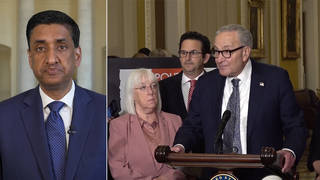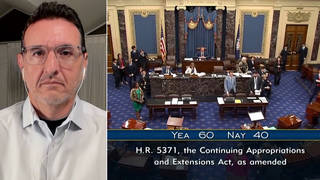
Topics
Guests
- Glen MpaniMason fellow at the Kennedy School of Government at Harvard University. He is a democracy and governance practitioner who has worked for the last 15 years in Africa.
In Zimbabwe, longtime leader Robert Mugabe is refusing to resign as president, amid a growing political crisis. Last week, Mugabe was placed under house arrest after Zimbabwe’s military seized Parliament, courts, government offices and the main airport in the capital, Harare. The apparent coup came a week after President Mugabe ousted his vice president, Emmerson Mnangagwa, who’s since been named by the military as interim president. Members of Zimbabwe’s ruling party are preparing to meet to discuss Mugabe’s impeachment, after the deadline for him to resign came and went this morning. On Sunday, Mugabe gave a televised address acknowledging the country’s problems, but did not mention stepping down. Zimbabwe’s ruling party, ZANU-PF, has expelled Mugabe and first lady Grace Mugabe from the party. Impeachment proceedings against Mugabe may now begin as soon as Tuesday. For more, we’re joined by Glen Mpani, Mason fellow at the Kennedy School of Government at Harvard University. He is a democracy and governance practitioner who has worked for the last 15 years in Africa. His recent op-ed in The New York Times is titled “For Zimbabwe, a Coup Isn’t the Answer.”
Transcript
AMY GOODMAN: We begin today’s show in Zimbabwe, where longtime leader Robert Mugabe is refusing to resign as president, amidst a growing political crisis in Zimbabwe. Members of Zimbabwe’s ruling party are preparing to meet to discuss Mugabe’s impeachment, after the deadline for him to resign came and went this morning. On Sunday, Mugabe gave a televised address acknowledging the country’s problems, but did not mention stepping down.
PRESIDENT ROBERT MUGABE: Whatever the pros and cons of the way they went about registering those concerns, I, as the president of Zimbabwe and as their commander-in-chief, do acknowledge the issues they have drawn my attention to, and do believe that these were raised in the spirit of honesty and out of deep and patriotic concern for the stability of our nation.
Of greater concern to our commanders are the well-founded fears that the lack of unity and commonness of purpose in both party and government was translating into perceptions of inattentiveness to the economy. Open public spats between high-ranking officials in the party and government, exacerbated by multiple conflicting messages from both the party and government, made the criticisms leveled against us inescapable.
AMY GOODMAN: Zimbabwe’s ruling party, ZANU-PF, has expelled Mugabe and first lady Grace Mugabe from the party. Mugabe had been working to hand over power to his wife Grace. The impeachment proceedings against Mugabe may now begin as soon as Tuesday.
Last week, President Mugabe was placed under house arrest after Zimbabwe’s military seized Parliament, courts, government offices and the main airport in the capital, Harare. The apparent coup came a week after President Mugabe ousted his vice president, Emmerson Mnangagwa. The military says it’s appointed him as the interim president of Zimbabwe.
On Sunday, after a week of relative calm, residents in Harare took to the streets to celebrate the expected announcement of Mugabe’s resignation, only to be disappointed by his refusal to step down.
HARARE RESIDENT: We were expecting to hear the president say, “I have heard your concerns yesterday, and I’m ready to step down.” This wasn’t—this is not what we were expecting, to hear a long speech, without any results for us. The results were simple: “I am stepping down. I am handing over the country to someone else.”
AMY GOODMAN: Robert Mugabe has held power since Zimbabwe declared independence 37 years ago.
Well, for more, we’re joined by Glen Mpani, Mason fellow at the Kennedy School of Government at Harvard University in Cambridge, Massachusetts, democracy and governance practitioner who’s worked for the last 15 years in Africa. His recent op-ed in The New York Times is headlined “For Zimbabwe, a Coup Isn’t the Answer.”
Glen Mpani, welcome to Democracy Now! Can you talk about what is the latest in Zimbabwe, and give us background on how to understand it?
GLEN MPANI: Thank you so much. It’s good to be on your show.
As you are aware, Zimbabwe has been confronted with an economic and political crisis for the last 20 years. The crisis has been largely due to bad governance, centralization of power and the inability of the ZANU-PF government to be able to provide alternative solutions to address the economic crisis. The crisis has also resulted in the country’s being placed on sanctions. It has resulted in multitudes of Zimbabwe fleeing the country to go to other countries to be able to eke a living. And if you look at some of the key things that have been a major challenge for a day-to-day Zimbabwean, unemployment is at 98 percent. There are shortages of water, electricity and cash within the country. So these are some of the major economic issues that have been a problem.
But of major concern the last three, four years, there have been issues that have to deal with succession within ZANU-PF. And within ZANU-PF, there have been two major factions that have been trying to show that they can be able to succeed Mugabe. One of the factions was led by the former vice president, Emmerson Mnangagwa, who was booted out a couple of weeks from ZANU-PF. And the other faction was led by the first lady, Grace Mugabe, which is—which the president of Zimbabwe, Mugabe, is regarded to have been part of.
So, this jostling for position reached fever pitch a couple of weeks ago, when there was the expulsion of the vice president from his post as the vice president of the country, as a result that he was fanning a—he was promoting factionalism. And in that process, a free-for-all event took place, where we saw the security, which has been very close to Vice President Mnangagwa, aligning themselves to it and, in essence, moving in to ensure that they can be able to restore him. On the other side, the faction that was aligned to the first lady was pushing to ensure that they paid all the structures and ensure that they aligned them with the faction of the first lady. So what we are confronted with here is factional issues or intraparty disagreements within ZANU-PF that have largely sped into a national crisis.
And, unfortunately, there has been now a convergence of issues, where Zimbabweans, the general public, is tired of the leadership of ZANU-PF. And they have been saying it for many, many years. And now we have one individual who everybody is in agreement that they should go. We have got a faction in ZANU-PF that would not want him to stay, and the generality of Zimbabwe that would not want him to be there. So there is a common enemy on the ground to say, “Let’s get him out.”
But there are nuances that people need to pick out. The nuances are as follows. The ZANU-PF faction that is pushing for this, in all intents and purposes, is not sincere in terms of economic recovery and democratization of Zimbabwe. They are simply doing it simply because they want to install one of their own. And the people rallying with them, they are using it as an opportunity for them to be able to gain legitimacy, for them to be able to sanitize themselves as a pro-democratic movement. But, in essence, that is not their agenda and their cause.
AMY GOODMAN: So, talk about, for people who are not familiar with Zimbabwe’s history, 37 years ago gaining independence from England—it used to be called Rhodesia, for Cecil Rhodes—Robert Mugabe a leading independence activist, as was his vice president, who has just been appointed president. Give us the history of Zimbabwe in Africa.
GLEN MPANI: Zimbabwe attained independence in 1980 and offered a lot of hope for the continent. I think if you look at the history of Zimbabwe, we are regarded as the bread basket of the continent. We largely were able to produce commodities, such as tobacco. We were able to feed ourselves and to feed other regions on the continent. We were able to have a very robust and vibrant education system. Our health sector was very effective. And we were proud as a country, for us to be able to provide a shining example in terms of how a country can be able to transition from colonial rule.
But what remained post-independence, 1980, was that we had the dominance of ZANU-PF. Regardless of the dominance of ZANU-PF there and the existence of ZAPU as an opposition party, which it largely also played the very pivotal role during the liberation struggle, we focused more on the economy and paid very little attention in terms of the politics. So the idea of centralizing authority and power remained a key tenet of the ZANU-PF government. But, unfortunately, because there was very little opposition to them, there was less attention that was paid to them, because they were a darling of the West. The British loved them so much. Donors were pouring money to Zimbabwe.
But in pre-2000, when they went on to introduce the IMF conditions for them to be able to reform the economy, we started noticing, one, the cutting down of the social base. Levels of unemployment increased. There was now high inflation. And this, in the instance, led to the rise of the Zimbabwe Congress of Trade Unions, the largest labor movement, that resulted in the formation of the now major political party in Zimbabwe, the Movement for Democratic Change. This ushered in a new era within Zimbabwean politics, where the Zimbabwe Congress of Trade Unions was now challenging the government to say, one, there are high levels of corruption; two, the basic livelihood issues of ordinary Zimbabweans cannot be met. And this resulted in the formation of an opposition. And this opposition, since 2000, has successfully been—successively been participating in elections, which have largely been seen as unfair in the way it has been seen to have won.
But, unfortunately, because of the military, this military that has just intervened, which played a role in instituting violence, rigging of elections, inflicting reprisals on key activists, it became very, very difficult for any prospect of an opposition being able to get into office through an electoral process. I recall there was even an instance where all these generals had to do a press conference where they categorically stated that in no way would they allow anyone who has never fought in the liberation struggle to be a leader of Zimbabwe. And true to their word, they have been very consistent. And if you see what is currently happening, they are making sure—because the G40 is regarded as a faction within ZANU-PF of young people who don’t have liberation credentials. So, true to their word, the insistence of them intervening, to have Mnangagwa come in as their candidate, is in line with their agenda that they will never accept anyone who doesn’t have liberation credentials.
AMY GOODMAN: Glen Mpani, I wanted to ask you about Zimbabwe’s opposition leader, Morgan Tsvangirai, who you were talking about, who returned to Zimbabwe from South Africa reportedly discussing plans to form a government of national unity with Emmerson Mnangagwa, who the military has appointed as interim president. Tsvangirai served as prime minister under Mugabe from 2009 to ’13, former labor activist who was repeatedly arrested by Zimbabwean authorities, subject to beatings, torture while in jail. We only have a minute and a half, but if you can talk about both Tsvangirai, Mnangagwa and the power of the first lady, as well? If you can talk about the power of Grace Mugabe and where she fits into this, now also expelled from the party?
GLEN MPANI: Let me start with the first lady. I think the first lady made a greater disservice to Mugabe, whose image had already been eroded. I think she overstretched their hand. She overplayed their hand and, in essence, did not manage to be able to play an effective role in ensuring that Mugabe can steer this succession agenda. She played a very divisive role. And, unfortunately, this has culminated into this. And if we listen to most Zimbabweans, they expressed greater revulsion and hatred in terms of what she has done, because, in essence, she caused this to be able to implode. So, if you are to move away from looking at Grace—and so, moving forward, as a factor, I don’t see her as a factor. I think if she’s going to play a role, she will play a role within ZANU-PF—that is, if they want her. But from the signs that are there, they have expelled her, and I don’t think there will be an opportunity. If Mugabe leaves, I don’t think she will have any opportunity in any realignment or in the future politics for Zimbabwe. This might actually be the end of her political career.
When it comes to Mnangagwa and Tsvangirai, I think they can come up with an alliance of convenience, where they can say, “Let’s have an interim arrangement or transitional government.” But I don’t see that bringing any meaningful change. It can bring relief in an interim phase, but it will not work. Both of them are desperate. Mnangagwa wants legitimacy. He wants international acclaim. Morgan Tsvangirai is desperate. He also wants to get into government, considering that he’s not also feeling well. So they are joined together by their personal missions.
AMY GOODMAN: He’s undergoing cancer treatment, right?
GLEN MPANI: He’s also undergoing cancer treatment. But in terms of the greater good, I see an elite pact. I don’t see any substantive reforms, in terms of them coming out of this process. I don’t think all three have the appetite for them to push an agenda. So, unfortunately, if citizens in Zimbabwe don’t challenge whatever deals or decisions that whatever interim arrangement is going to come up with, they will realize that we have another 37 years where the status quo remains, because now elite interests and selfish interests are now taking precedence over what needs to be done in terms of reforming Zimbabwe.
AMY GOODMAN: I want to thank you so much, Glen Mpani, for joining us, Zimbabwean scholar, Mason fellow at the Kennedy School of Government at Harvard University, democracy and governance practitioner who has worked for the last 15 years in Africa. We’ll link to your piece in The New York Times, “For Zimbabwe, a Coup Isn’t the Answer.”
When we come back, the U.N. climate summit has just wrapped up. We’re just back from Bonn, Germany. We’ll speak with Pittsburgh Mayor Bill Peduto, who was part of the anti-Trump revolt in Bonn. Remember when President Trump said, “I serve Pittsburgh, not Paris”? So we’ll hear from Pittsburgh. Stay with us.











Media Options